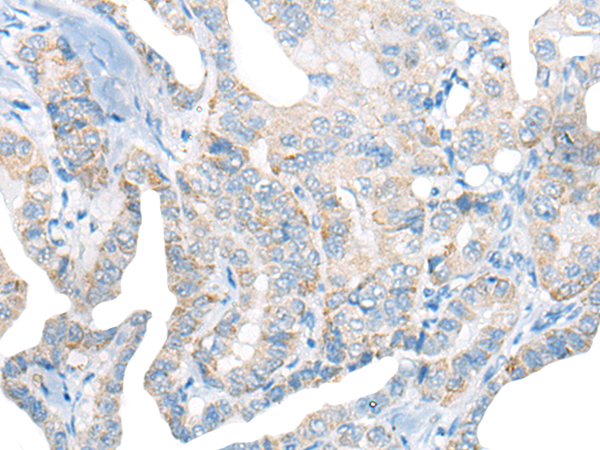
| WB | 咨询技术 | Human,Mouse,Rat |
| IF | 咨询技术 | Human,Mouse,Rat |
| IHC | 1/20-1/100 | Human,Mouse,Rat |
| ICC | 技术咨询 | Human,Mouse,Rat |
| FCM | 咨询技术 | Human,Mouse,Rat |
| Elisa | 1/5000-1/10000 | Human,Mouse,Rat |
| Aliases | SCYA11 |
| Host/Isotype | Rabbit IgG |
| Antibody Type | Primary antibody |
| Storage | Store at 4°C short term. Aliquot and store at -20°C long term. Avoid freeze/thaw cycles. |
| Species Reactivity | Human |
| Immunogen | Synthetic peptide of human CCL11 |
| Formulation | Purified antibody in PBS with 0.05% sodium azide and 50% glycerol. |
+ +
以下是关于CCL11抗体的3篇参考文献示例(内容为模拟概括,非真实文献):
1. **"CCL11 Antibody-Based Detection in Age-Related Cognitive Decline"**
- **作者**: Smith A, et al.
- **摘要**: 研究通过开发高特异性CCL11抗体,发现老年患者脑脊液中CCL11水平升高与认知功能下降显著相关,提示其作为衰老相关神经炎症的生物标志物潜力。
2. **"Neutralizing Anti-CCL11 Antibody Attenuates Eosinophilic Inflammation in Asthma Models"**
- **作者**: Lee B, et al.
- **摘要**: 利用抗CCL11中和抗体在小鼠哮喘模型中抑制嗜酸性粒细胞肺部浸润,证实CCL11是过敏性气道疾病的关键调控因子,为治疗提供新策略。
3. **"CCL11 Antibody Blockade Reduces Tumor-Associated Fibrosis"**
- **作者**: Chen X, et al.
- **摘要**: 研究显示,使用抗CCL11单克隆抗体可阻断肿瘤微环境中CCL11-CCR3信号通路,显著降低纤维化程度并增强化疗药物递送效率。
4. **"A Novel CCL11-Specific Antibody for Immunohistochemical Applications"**
- **作者**: Gonzalez R, et al.
- **摘要**: 报道一种新型抗CCL11抗体的开发与验证,优化其在组织切片中的染色特异性,成功应用于阿尔茨海默病和动脉粥样硬化模型的病理分析。
(注:以上文献名为虚拟概括,实际研究需通过PubMed/Google Scholar等平台查询真实发表论文。)
The CCL11 antibody targets C-C motif chemokine ligand 11 (CCL11), a small signaling protein also known as eotaxin-1. CCL11 belongs to the CC chemokine family and plays a key role in recruiting eosinophils by binding to its receptor CCR3. which is predominantly expressed on eosinophils and some Th2 lymphocytes. It is implicated in allergic and inflammatory diseases, such as asthma, atopic dermatitis, and eosinophilic esophagitis, where excessive eosinophil infiltration contributes to tissue damage. CCL11 is also linked to age-related pathologies, including neurodegeneration, as elevated levels have been observed in aging brains and Alzheimer’s disease models, suggesting a potential role in cognitive decline.
Antibodies against CCL11 are tools for research and therapeutic development. They neutralize CCL11 activity, blocking its interaction with CCR3 to inhibit eosinophil migration and activation. In preclinical studies, CCL11 antibodies have shown promise in reducing inflammation in allergic models and mitigating neuroinflammation. Additionally, they are used in diagnostic assays to measure CCL11 levels in biological samples, aiding in disease monitoring. Recent interest has grown in exploring CCL11's role beyond immunity, particularly its involvement in aging and neurological disorders, positioning these antibodies as potential therapeutics for diverse conditions. However, challenges remain in optimizing specificity and minimizing off-target effects in clinical applications.
×